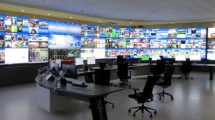
Ships of a certain size and type are mandated to go paperless by 2014 and Jimmy Grewal, executive director of Dubai-based marine services provider, Elcome International LLC, in conversation with SatellitePro ME, believes that this is an opportunity for the marine Satcom sector.
“To date, there has not been that one mandatory application that has compelled ship owners towards always-on connectivity. To benefit fully from ECDIS, there will be a need to have internet connectivity wherever the vessel operates”
There is a monumental shift under way in the marine sector, and non-marine ‘muggles’ must tour the chart division in the sprawling headquarters of Elcome International to appreciate the International Maritime Organisation (IMO) ruling that has mandated the Electronic Chart Display and Information System (ECDIS) system on ships.
ECDIS is a computer-based navigation information system that can be used as an alternative to paper nautical charts. When you look at the reams of paper charts at Elcome and understand the time-honoured manual tradition followed to keep ships safe, you begin to appreciate the concerns of vessel owners as their crew enters somewhat unchartered digital territories.
Speaking to SatellitePro ME from his well-appointed office at Dubai Investments Park, Jimmy Grewal, executive director of Elcome International LLC, says, “Vessels of a certain size that are being built now must have a single ECDIS station with paper charts, or if they want to get rid of paper navigation charts, they need the dual ECDIS system. By 2014, all vessels above a stipulated size must have the system on board.”
More than digital navigation charts
Grewal argues that the ECDIS system his company is offering from manufacturers such as Transas are much more than digital navigation maps. “People view maps and navigation as something static – but that’s not true. Elements are changing all the time – there are new ports, new constructions, the sea bed is changing all the time and there are wrecks, among other factors. For efficient and safe navigation, you need to have up-to-date information.
“The ECDIS system makes navigation easy and significantly improves safety at sea. It offers precise information about the position of the ship, and includes intuitive route planning functions, ensuring optimal navigation routes, which in turn leads to reduced fuel consumption.”
The critical factor of training
Companies are concerned about retrofits as the deadline looms, says Grewal. “Approved manufacturers have released systems and some are cost-effective PC-based systems. Others offer integrated solutions, incorporating radar etc. By themselves, the products can obviously do little. The crew needs to be trained on operating and maintaining the system. Vessel owners are aware of this as they are scrambling to comply with regulations.”
On their part, Elcome International is partnering with Maersk Training and will be offering certified courses complete with simulation. “We are trying to create a total solution,” reiterates Grewal. “We believe that the trend is towards integrating more data sources with the ECDIS system. With the large display monitors the system typically comes with, the ECDIS system is ideal for integrating the other systems on the ship. There will be significant demand for ECDIS customers to have always-on connectivity.”
The International Maritime Organisation ruling
For newbuild passenger ships of 500 gt and above and tankers of 3,000 gt and over, ECDIS becomes compulsory from July 1, 2012, and for other newbuild vessels at dates up to 2014. For existing vessels, the phase-in period is from 2014-2018, depending on type and size.
Impact on marine Satcom
“To date, there has not been that one mandatory application that has compelled ship owners towards always-on connectivity,” says Grewal.
He adds, “To benefit fully from ECDIS, there will be a need to have internet connectivity wherever the vessel operates. The landscape is shifting and this will significantly impact the market for maritime Satcom.”
The cost of satellite connectivity is a concern for vessel owners, concedes Grewal. “On the vast majority of ships, there is no integration between the systems on board and satellite connectivity. Customers are concerned that if they link their systems to the broadband connectivity on board the ship, they will incur very high charges – and that is not necessarily wrong.
“What we are doing is to offer solutions that intelligently use the bandwidth, so that the vessel owners can manage their costs and take advantage of the connectivity. With the ECDIS system on board, there is a range of applications from environmental monitoring and fuel efficiency to anti-piracy measures that can be installed. Also, unlike paper charts, changes can be downloaded. We identify the charts you need for the voyage, manage the purchase and licensing of the charts and provide the software to manage the charts.”
Demonstrating return on investment (ROI): Onus on solutions providers
While the ruling by the IMO does not automatically enhance the business for maritime Satcom, it is up to solutions providers such as Elcome to demonstrate the returns on investment by integrating the ECDIS system with the on-board connectivity solution, says Grewal.
“It is possible to have ECDIS with no connectivity and get the updates via CD. Then the vessel owner is doing the bare minimum to comply. With internet connectivity, you would have real-time information from data providers that can enhance the operation of a vessel. It is not just about efficiency but also about safety.
The current economic climate compels us to demonstrate ROI and as long as we do that we will find customers willing to make the investment.”














Add Comment